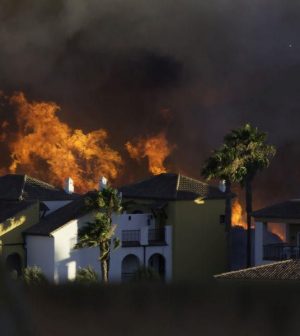- The Best Time of Day to Drink Bone Broth to Maximize Health Benefits
- 8 Ways to Increase Dopamine Naturally
- 7 Best Breads for Maintaining Stable Blood Sugar
- Gelatin vs. Collagen: Which is Best for Skin, Nails, and Joints?
- The Long-Term Effects of Daily Turmeric Supplements on Liver Health
- Could Your Grocery Store Meat Be Causing Recurring UTIs?
- Are You Making This Expensive Thermostat Error This Winter?
- Recognizing the Signs of Hypothyroidism
- 10 Strategies to Overcome Insomnia
- Could Artificial Sweeteners Be Aging the Brain Faster?
Mental Health Trauma Plagues Wildfire Survivors

The 2018 wildfire that destroyed 239 square miles in Northern California, including the town of Paradise, left a lasting mental health crisis in its wake.
Many residents who survived the so-called Camp Fire are now grappling with chronic post-traumatic stress disorder (PTSD) and depression, according to a new study in the International Journal of Environmental Research and Public Health.
“We looked for symptoms of these particular disorders because emotionally traumatic events in one’s lifetime are known to trigger them,” said senior author Jyoti Mishra, a professor of psychiatry at the University of California, San Diego School of Medicine.
While people with preexisting childhood trauma or sleep problems were at risk for mental health problems, personal resilience and mindfulness appeared to reduce them, the study found.
“We show climate change as a chronic mental health stressor. It is not like the pandemic, in that it is here for a period of time and can be mitigated with vaccines and other measures. Climate change is our future, and we need immediate action to slow down the changes being wreaked upon the planet, and on our own well-being,” Mishra said in a university news release.
For the study, her team did several mental health assessments of residents exposed to the Camp Fire six months later and compared them to people living farther away.
About two-thirds of participants lived in or around Chico, a city 10 to 15 miles from the center of the wildfire. The rest lived in San Diego, about 600 miles away.
Researchers found that people who lived near the fire had increases in PTSD, depression and anxiety. And these were made worse by proximity and exposure to the fire and by childhood trauma, such as abuse and neglect.
Chronic mental health problems from the fire were eased by physical exercise, mindfulness and emotional support. Researchers said all of these may contribute one’s ability to bounce back after stressful events.
The concerning thing is that stressful events like the Camp Fire are on the rise due to climate change.
“Since the 1970s, fire extent in California has increased by 400%,” said study co-author Veerabhadran Ramanathan, professor of atmospheric and climate sciences at Scripps Institution of Oceanography at UC San Diego.
“While a faulty transmission line may have lit the Camp Fire in 2018, it is part of an overall disastrous multi-decadal trend fueled by human-caused climate warming,” he said in the release. “Through evaporative drying of the air, the soil and the trees, warming acts as a force multiplier.”
Ramanathan noted that by 2030, warming is expected to increase by 50%, making mental illness a “grave risk” for the future — and not just in California.
“Unchecked climate change projected for the latter half of this century may severely impact the mental well-being of the global population,” the authors wrote. “We must find ways to foster individual resiliency.”
More information
For more on PTSD, see the U.S. National Institute of Mental Health.
SOURCE: University of California San Diego Health, news release, Feb. 9, 2021
Source: HealthDay
Copyright © 2026 HealthDay. All rights reserved.










